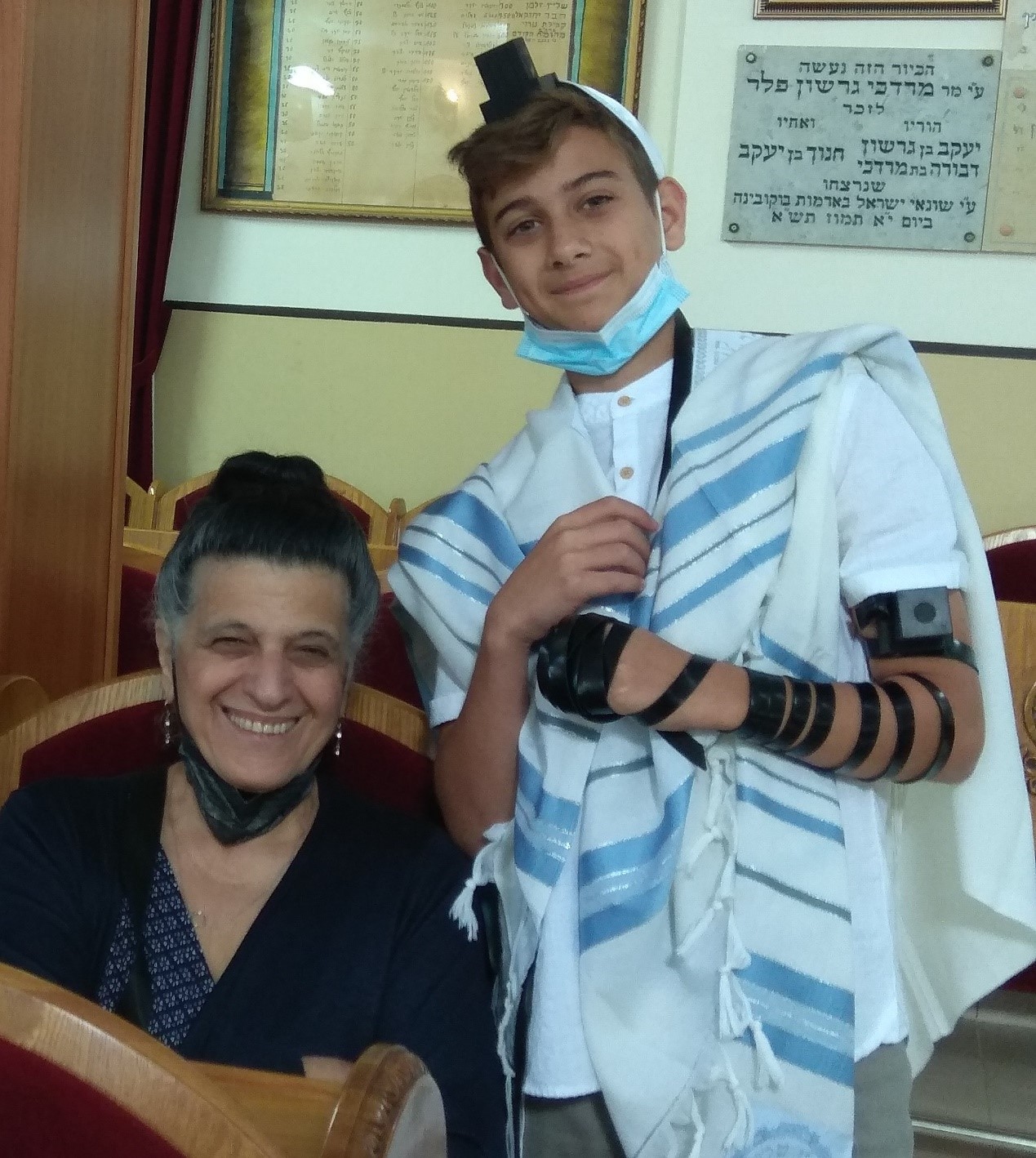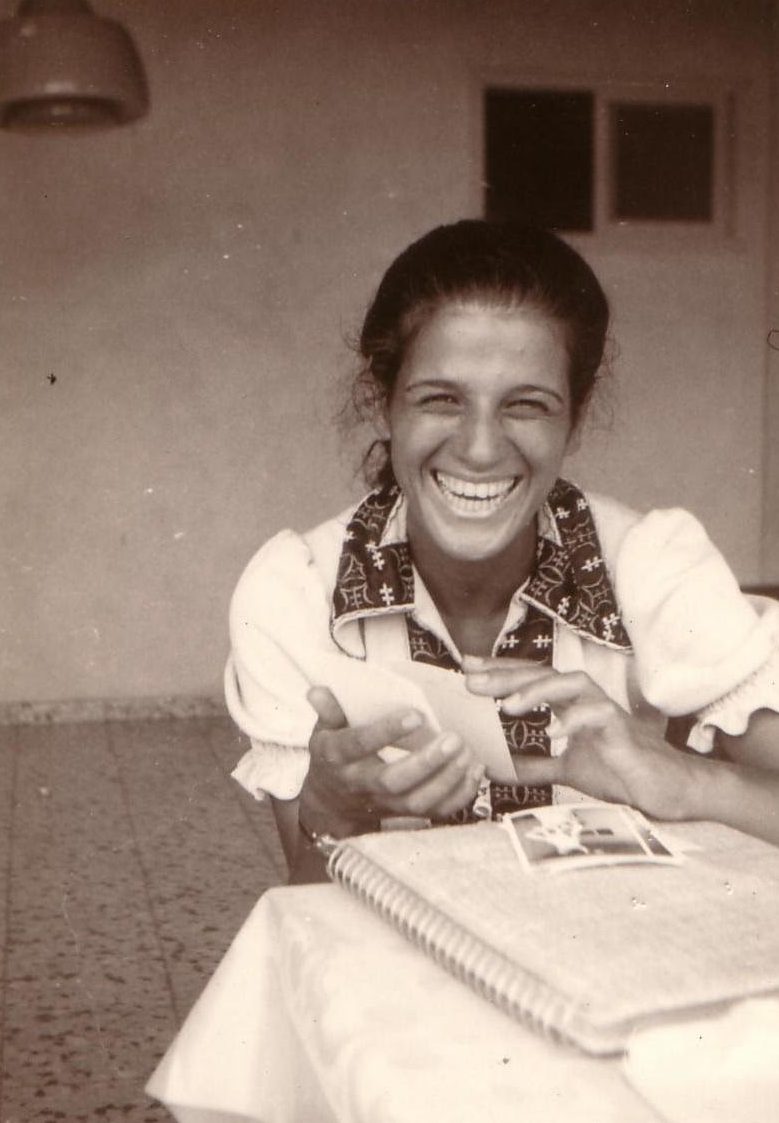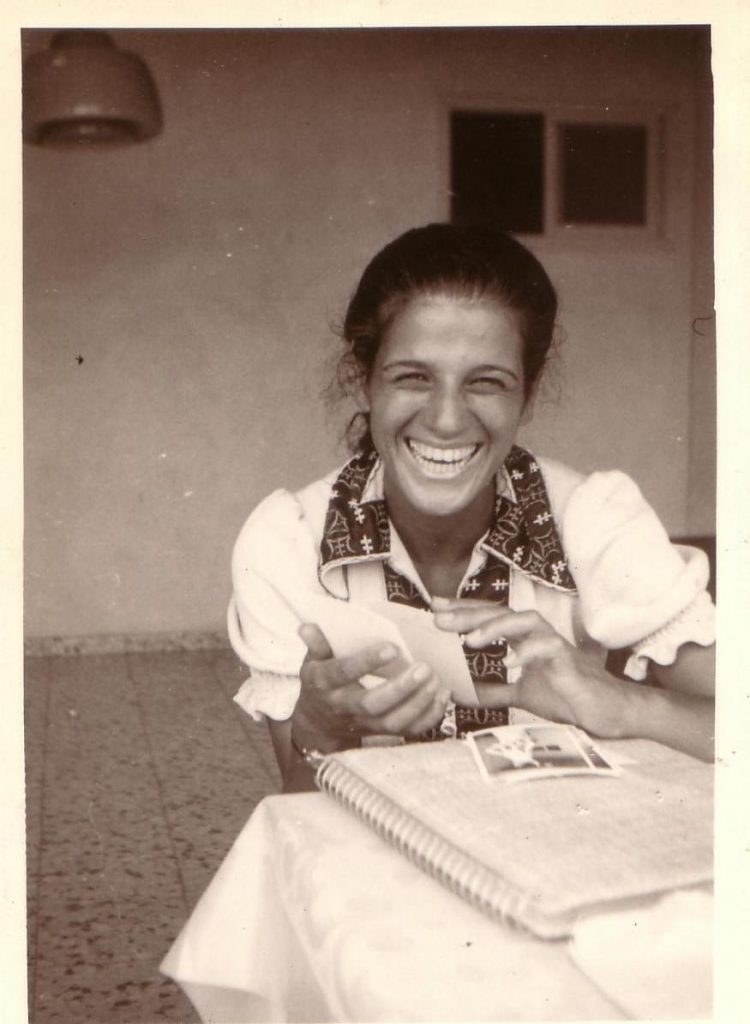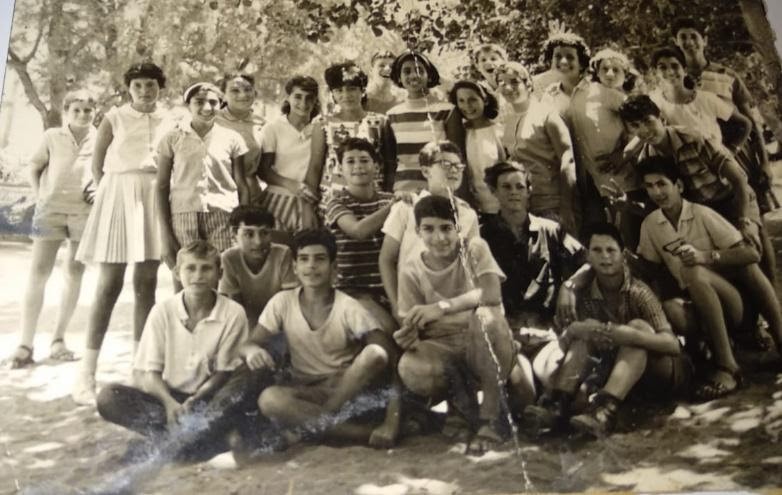My grandmother was once a girl


My Grandma’s Childhood
My granny told me about her childhood: "I grew up in Rehovot. I remember the vast expanses of white sand, metal barracks and many orchards. After a few years I moved with my family to the neighborhood "Neve Yehuda". Every year we celebrated the "Citrus Day" because "Rehovot" was the city of citrus. We walked around the Weizmann Institute and rode along the green lawns.
My friends and I traveled in the fields along the railroad tracks. Ones we even saw a hyena and jackals.
I chose this photo of my grandma because this is the only picture of my grandma when she was young. In the picture, which was taken in 1968, my grandma is sitting on a chair next to a small table and organizing photos in her family album, in her father house in "Rehovot". She is wearing a white shirt with puffed sleeves, with decorations. In the picture, my grandma looks very happy, she has a big smile. My great-grandfather "Yosef" took this picture. I think that my great-grandfather probably told her something funny.
Three questions I would like to ask my granny about the photo:
Why did you smile in the photo? Which photos did you organize in the family album? Would you like to go back to that period?
The special object that I remember from my childhood is a glass of wine and a matching small saucer made of silver. This glass is very special to me because every Saturday and on holidays, my father and my uncle blessed for the wine before the meal (Kiddush). This glass reminds me our family meals on Saturdays and holidays. I really miss it.
The games I played and activities I took part as a child were: Climbing trees, Jump rope, hopscotch, marbles, apricot pit, Hide and Seek Game, Catching game. My grandmother grew up in a home with six brothers and sisters. Her family immigrated from Iraq and maintained the special Jewish tradition.
One of the customs she loved the most was on Passover, probably because she was born on this holiday. On this holiday the tradition was to prepare a special "charoset" for the family. My grandmother remembers that one Passover evening her mother let her make the special "charoset" and she was very excited. Another traditional dish that her family ate all the time is Iraqi cholent called "Tbit" (chicken stew with rice and vegetables) It was her favorite dish as a child. Today, the dish she loves the most is: another traditional Iraqi dish: eggplant and egg "Sabic".
Tbit – Iraqi Slow Cooked Chicken and Rice
Iraqi style dish. Chicken with rice and the goodness of spices! Just perfectly comforting and yummy.
Ingredients
· 500gr Chicken Thighs/ Drumsticks washed and dried
· ½ Onion – Chopped
· ½ Tomato – Chopped
· 1 Garlic Clove – Chopped
· 1 tbsp Vegetable Oil
· ¾ Cup White Rice (I used Jasmine)
· 1½ Cup Hot Boiling Water
· 1 tsp Tomato Paste
· Handful of Raisins
· ⅛ tsp Ground Clove
· ¼ tsp Ground Cinnamon
· ½ tsp Ground Nutmeg
· ¼ – ½ tsp Salt
· Black Pepper
Instructions
Preheat oven to 210F/ 100C
In a cast iron/ cast aluminum (oven safe) pot, preheat the oil over medium-high heat and add the chopped onion. Sauté for 2-3 minutes until translucent.
Add in the chopped tomato and garlic and stir for another minute.
Add the chicken and let cook while stirring and turning occasionally until chicken is cooked on all sides. Cook and stir for about 5-7 minutes.
Add in the rice, water, spices, tomato paste and raisins and mix together. Let cook and boil for about 7-10 minutes and remove from heat.
Place in the preheated oven and let cook overnight (8-10 hours)
My Grandmother's School
At my grandmother's school there were no strict rules. My grandmother studied in "Shprinzak" School in Rehovot. The children respected the teachers and had a good relationship. Every day at eight in the morning there was a ceremony with morning exercise and all the children sang an Israeli song together.
The school subjects learnt at that time were: Math, English, History, Geography, Science and Hebrew. Special programs and activities were not common except for a "Talmud" class with the school principal once a week. My grandmother loved this lesson. The teachers’ attitude to the students was stricter than today. My grandma told me that her teacher shouted at her because she yawned without covering her mouth, But in general, the attitude was good and there was a respectful relationship between the teachers and the students.
At my grandmother's school they studied from eight to two in the afternoon so at school they did not serve lunch. Each child brought a sandwich from home. My grandmother's school did not have a uniform. My grandmother told me she used to wear a shirt and a skirt. The thing my grandmother did not like most about school was punishments. She told me there were no punishment of being expelled from school, but teachers put disturbing children in the corner.
Grandma's favorite teacher was named Dalia. She taught mathematics, History and Hebrew. My grandmother loved her because she was nice and very funny.
The differences between my grandmother's school and my school are: the subjects in my school are more varied, I do not have a morning ceremony accompanied by physical activity, my school has a uniform and there are penalties of suspension from school.
The common things between my grandmother's school and my school are the basic school subjects, in my school students also bring food from home.
A picture of my grandmother's brother's class at the "Shprintsak" school
My Grandpa's Aliya
My grandma's family made aliya from Iraq in 1951. My grandmother was born in Rehovot, in Israel on the evening of Passover 1952. She was the first girl in her family (the fifth of seven siblings) to be born in Israel.
Although she didn't make aliya to Eretz Israel herself, she and her family experienced the difficulties of the "aliya" together. My grandmother lived in an immigrants' camp in Rehovot called "maabara"- a transit camp designed to house the big waves of "Aliya" that came to Israel after the establishment of the state.
During my grandmother's childhood period (which coincided with the "childhood" period of the State of Israel), a number of historical events took place in the history of the State of Israel: In 1956, the "Sinai War" broke out. She remembers that her cousin, who was a soldier, came to their immigrant camp in uniform and shared stories from the front.
In 1967, the Six Day War broke out. My grandmother remembers these were times when insecurity was felt in the country. In those days, they had no shelters, they dug ditches in the orchards of streets and hid there. While hiding in the trenches, they heard the echoes of the tank bombs. My grandmother remembers the atmosphere of victory after the war, the conquest of the Western Wall and that there was an atmosphere of joy and excitement.
It was not easy for my grandmother's family to make "Aliya" to Eretz Israel. They faced with language and economic difficulties, but they didn't regret for a moment their decision to come to Israel.
My grandmother's favorite word
My grandmother's favorite word is joy – a feeling of pleasure, satisfaction and great desire, a cheerful mood.
Grandma's favorite phrase is "All for the best" – This phrase comes from a belief in Judaism, which means that God directs the circumstances so that even if things are difficult and cause suffering their purpose is for the good.
Following the conversation with my grandmother
I learnt about growing up at that time. I found out that my grandmother grew up in a challenging time for her and her family, following the immigration of her family to Israel.
My grandmother lived in a small house with a large family of six brothers and sisters. Despite the many difficulties, my grandmother had a happy childhood, full of experiences with friends in nature around her home and a loving family. The childhood in the past was different from my own childhood in a lot of things: The games and activities in the past were mostly outdoors. Today, because of the computers and telephones, most of the activities are at home. In the past, tradition took a very important and central part of childhood experiences. Today tradition has a smaller part. In the past, children were more involved in household chores. Today children are less involved and more preoccupied with themselves.
הזוית האישית
Alon: I think this is a good program to learn about my grandma and my family tradition. I really enjoyed to spend time with my grandmother through this learning experience, especially during the corona time where we less saw each other.
Rachel: This is a blessed program. For me personally, it was missing to do a program like this with my grandparents. When your mother had a similar program at school, her grandparents were not alive to tell. While preparing this work with you, I closed a circle and had a lot of fun.
מילון
AliyahAliyah is the immigration of Jews from the diaspora to the Land of Israel historically, which today includes the modern State of Israel. Also defined as "the act of going up"—that is, towards Jerusalem—"making aliyah" by moving to the Land of Israel is one of the most basic tenets of Zionism. The opposite action, emigration from the "Land of Israel", is referred to in Hebrew as yerida ("descent").The State of Israel's Law of Return gives Jews, their children, and their grandchildren automatic rights regarding residency and Israeli citizenship. (Wikipedia)
ציטוטים
”my grandmother grew up in a challenging time for her and her family, following the immigration of her family to Israel“







